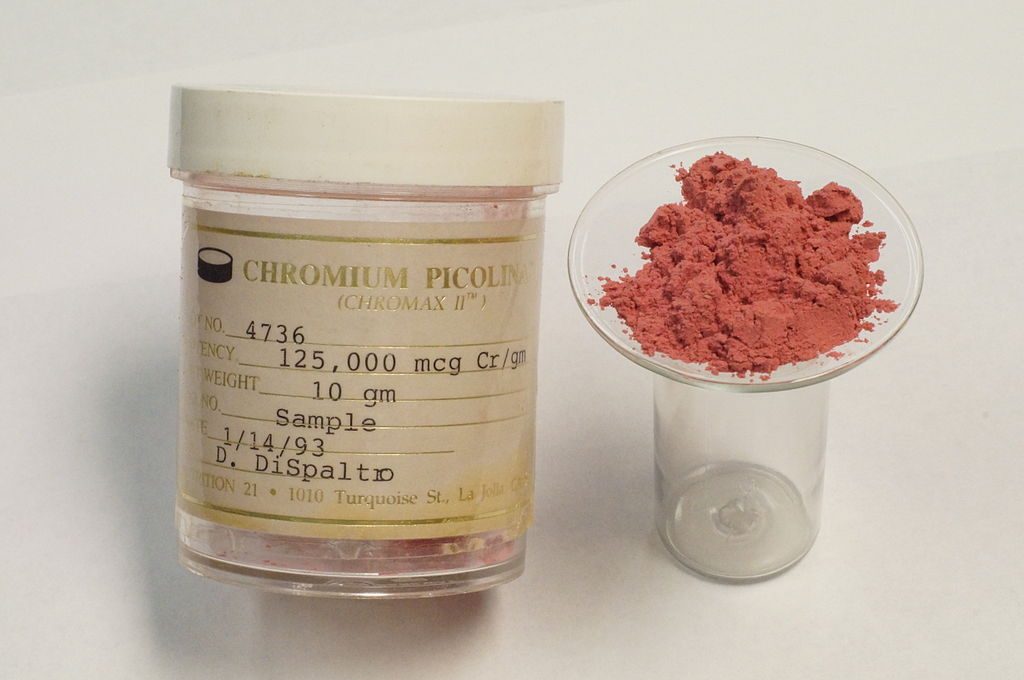Trace nutrient chromium may help diabetics control blood sugar, but research is inconclusive.

- Supporting insulin. Chromium is needed for the proper function of insulin, the hormone that regulates blood sugar levels.
Overview
Chromium is an essential trace nutrient present in a wide variety of foods, such as whole grains, cheese, liver, meat, and beer. It is best known for aiding the function of insulin, the hormone involved in carbohydrate, protein, and fat metabolism.
Given insulin’s critical role in controlling blood sugar, it’s not surprising that chromium supplements are mainly used by diabetics to help maintain healthy blood glucose and cholesterol levels. In addition, they are also used for supporting weight loss and lean muscle mass. Chromium is most commonly sold in the form of chromium picolinate.
In terms of blood sugar, chromium has been suggested to help correct both low (hypoglycemia) and high (hyperglycemia) blood sugar levels. However, research evidence has been mixed, and it’s too early to say if chromium supplementation helps with blood sugar.

How Chromium Might Help With Blood Sugar
Researchers are not yet fully sure about how chromium affects blood sugar, but the most popular, research-backed hypothesis is:
Aiding insulin function
Insulin is a hormone that plays the major role in making sure your blood sugar is not too high or too low. As part of Low-molecular-weight chromium-binding substance (also known as chromodulin), chromium appears to interact with insulin receptors. Through this action, it is believed to improve insulin sensitivity and blood glucose levels, the central characteristics of diabetes. 1 In addition, chromium also appears to suppress the enzyme phosphotyrosine phosphatase, which decreases insulin sensitivity by affecting the insulin receptor. 2

Chromium Uses & Benefits for Blood Sugar
Chromium is a popular supplement for diabetics and other individuals looking to lower their blood sugar levels. Despite this, four decades of clinical research of chromium supplementation has been inconclusive. Whereas some studies of chromium for maintaining healthy blood sugar and related uses such as fat loss and muscle gain have reported positive findings, others show no benefits.
Having said that, research suggests that people with diabetes are more likely to experience blood sugar benefits from chromium compared to healthy individuals.4 As one highly-cited systematic review of 20 studies of chromium’s effects on blood sugar concluded: “Data from RCTs show no effect of chromium on glucose or insulin concentrations in nondiabetic subjects. The data for persons with diabetes are inconclusive.” 5 This may be explained by the fact that low chromium levels can cause issues with glucose metabolism. 6In addition, multiple studies confirm that diabetics are likely to have lower chromium than healthy individuals.
Until more high-quality research is done, it seems that adding chromium to established diabetic/blood sugar medications and supplements is the ideal choice.
Research
Human Research
Clinical studies of the effects of chromium supplementation on blood sugar are inconclusive, with some studies demonstrating reduction of blood sugar levels, and others showing no effect.
Chromium picolinate (200-1000 mcg) may improve blood sugar in diabetics
This randomized, placebo-controlled study examined the effects of chromium supplementation on type 2 diabetes. A total of 180 diabetics continued taking normal medication, while also taking placebo or chromium picolinate (200 mcg or 1000 mcg) daily for 4 months. Both chromium groups experienced improvements in HbA1c, a measure of average blood sugar levels, and other measures of glucose.
- The researchers concluded that “…supplemental chromium had significant beneficial effects on HbA1c, glucose, insulin, and cholesterol variables in subjects with type 2 diabetes.” 7
Chromium picolinate (500-1000 mcg) does not appear to reduce blood glucose levels in diabetics
This randomized, double-blind, placebo-controlled study examined the effects of chromium supplementation on glycemic (blood sugar) control and insulin sensitivity in people with type 2 diabetes. A total of 46 participants were given placebo, 500, or 1000 mcg chromium picolinate daily for 6 months. There was no significant difference in HbA(1c) levels between the two groups.
- The researchers concluded that “There is no evidence that high-dose chromium treatment is effective in obese Western patients with type 2 diabetes.” 8
Chromium nicotinate (50-200 mcg) does not appear to improve blood sugar control in diabetics
This randomized, double-blind, placebo-controlled study evaluated whether chromium can improve blood glucose control. A total of 56 type 2 diabetics were given placebo, or chromium nicotinate (50 or 200 mcg) daily for 90 days. There were no difference between the groups on the HOMA-IR, a method of evaluating insulin resistance.
- The researchers concluded that “50μg and 200μg supplementation with chromium nicotinate for 90days did not promote improvements in glucose homeostasis…” 9
Brewer’s yeast (42 mcg chromium) may help diabetics control blood sugar
This randomized, single-blind, placebo-controlled study evaluated the effects of chromium on glucose and cholesterol in newly-diagnosed type 2 diabetics. Forty participants were given placebo or brewer’s yeast containing 42 mcg chromium daily for 3 months. The yeast group experienced a drop in fasting blood glucose levels and HbA(1)C levels, suggesting improved glucose control.
- The researchers concluded that “These data demonstrate beneficial effect of chromium supplementation on glycaemic control and lipid variables in subjects with newly onset type-2 diabetes.” 10
This randomized, double-blind, placebo-controlled, crossover study evaluated chromium levels and the effects of chromium supplementation on blood sugar control. Fifty type 2 diabetics were given placebo or chromium picolinate (400 mcg) daily for 12 weeks, and switched groups to repeat the experiment 4 weeks later.
The study found that diabetics had lower blood chromium than healthy individuals (32.3 nmol/L against 44.7 nmol/L), and that chromium supplementation improved fasting and post-meal blood sugar levels.
- The researchers concluded that “…chromium supplementation seems to improve glycaemic control in type 2 diabetic patients…” 11
Chromium picolinate (400 mcg) does not appear to improve blood sugar control in diabetics
This randomized, double-blind, placebo-controlled study examined the effects of chromium supplementation on blood sugar control diabetics. A total of 57 type 2 diabetics taking hypoglycemic drugs were given placebo or 400 mcg chromium picolinate daily for 6 months. There was no significant difference in HbA(1c) levels between the two groups.
- The researchers concluded that “There is no evidence that chromium in the form of chromium yeast is effective in improving glycemic control in Western patients with type 2 diabetes who are taking oral hypoglycemic agents.” 12
Dosage for Blood Sugar
- In clinical trials, chromium is typically used at dosages of 200 – 1000 mcg
- Chromium picolinate supplements typically provide doses of 200 – 500 mcg
- Multi-ingredient supplements usually use slightly smaller dosages, in combination with ingredients such as cinnamon
- Most people get sufficient amounts of chromium from a balanced diet, but diabetics may have lower levels
Available Forms
- Chromium picolinate. The most popular form of supplemental chromium where it is bound to picolinic acid, a form of niacin (vitamin B3). Also sometimes called chromium nicotinate.
- Chromium polynicotinate. A form similar to picolinate.
- Chromium GTF. A form of chromium advertised to have superior absorption, but is untested in research.
- Chromium can also come in forms of chromium aspartate and chloride, but these are rarely used due to lower absorption.
- ChromeMate®. A patented chromium-niacin complex which may have higher absorption than other chromium forms.
Supplements in Review Recommendation
- Chromium picolinate, 200-1000 mcg for blood sugar.
Chromium may help diabetics balance their blood sugar. Although the evidence is inconclusive, research suggests that diabetics may have lower than optimal chromium levels, which means supplementing chromium can improve their blood sugar.
Clinical research supports dosages of 200-1000 mcg. We recommend taking the 200-1000 mcg chromium picolinate dosages successfully used in human studies.
Leave a Reply